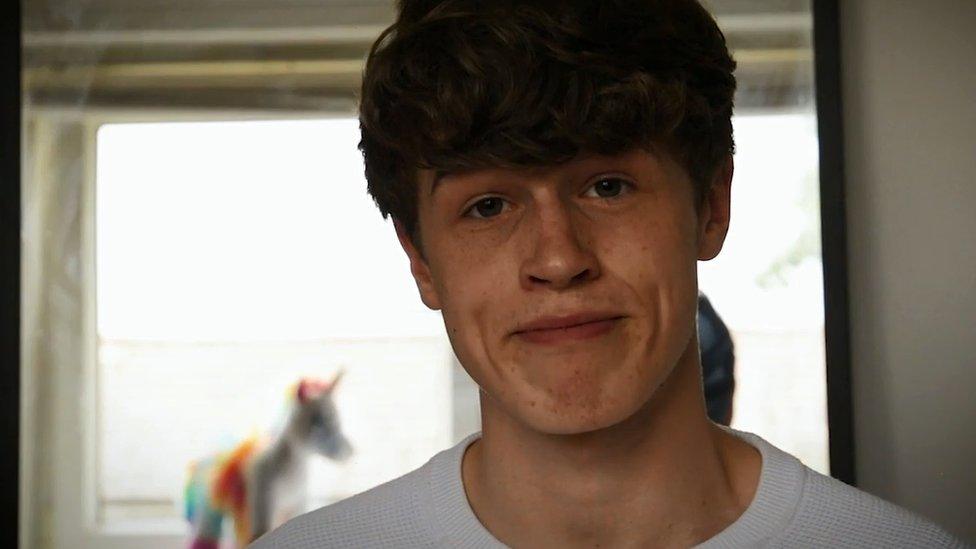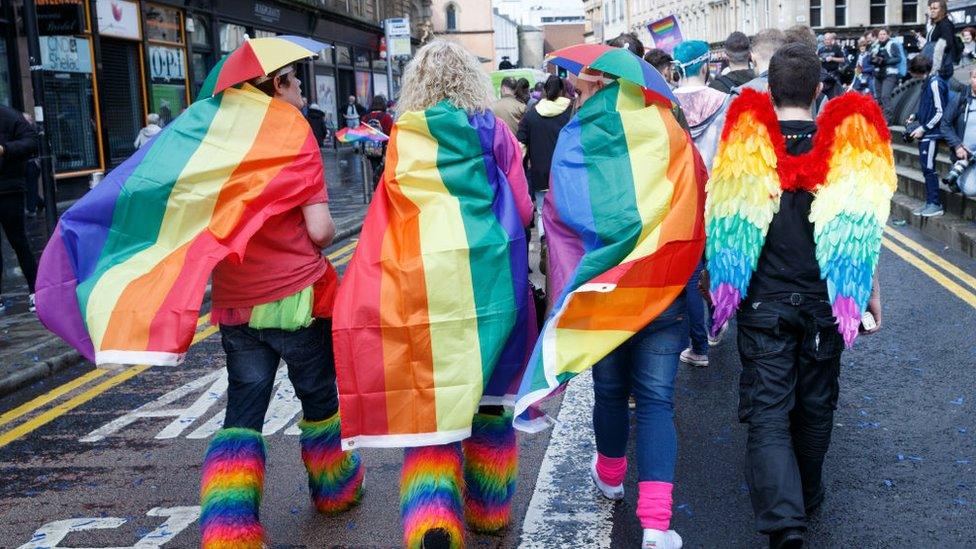Defiant selfie of hate crime victim
- Published
Blair Wilson posted a selfie on Facebook minutes after he was targeted in a homophobic attack
When Blair Wilson was targeted in a violent homophobic attack, he was left with a black eye and blood running down his face.
But within minutes of the assault, he posted a defiant selfie on social media which has received widespread acclaim.
The striking photograph shows him smiling broadly into the camera, with blood dripping from his nose and into his mouth.
Now the 21-year-old from Neilston, East Renfrewshire, has spoken to BBC The Social about the experience in his hometown.
He said he was walking home at about 22:35 on 29 June after visiting his mum when he heard homophobic abuse directed at him.
He could have ignored the cries of "poof" and "faggot" - instead he decided to confront his aggressors.
Bloody nose
"I was going to walk away but I had a moment where I was like 'I shouldn't be letting this happen in the place where I've lived for 21 years of my life'," he said.
"So I walked over to the people who shouted and I just asked 'Why?'. I wasn't physical or anything, I was just curious as to why they felt the need to shout that at someone who was minding their own business."
He said the man's girlfriend apologised for his behaviour, claiming he was drunk.
"That's when I said 'You need to watch out for him, hen'," Blair said. "Then he said you can't call girls 'hen' coz that's disrespectful.
"And I said, 'But you just called me a poof and your pal called me a faggot!'."

Blair has spoken to BBC The Social about the attack in his hometown
Blair started walking away but he heard his assailant following him.
"I turned round and then he kicked me in the chest and punched me in the nose, and that's when my nose started bleeding.
"Someone from the pub across the road ran across, broke it up and said 'just go home', and that's what I did - and I took the infamous selfie."
He said he wanted to share the selfie because he wanted to prove that he hadn't been beaten - even though he didn't physically fight back.
"I am not a very physical person," he said. "I think if I punched a fly, I'd break my fist. I don't really do fighting."
"I knew that if I put it on Facebook it would get at least some shares around Neilston and people would see it and he'd feel like an idiot and hopefully learn his lesson and not do it again.
"And, if not him, other people that maybe think the same way would change their opinion. So I just smiled, took the photo, wrote a bittersweet message and hoped for the best."


Homophobia in Scotland
Scotland's courts have seen an increase in the number of cases relating to homophobic hate crimes since new laws were introduced in 2010, external.
Official figures, external from the Crown Office and Procurator Fiscal Service show 452 crimes aggravated by sexual orientation were reported in 2010/11.
By last year, that figure had increased to 1,112 crimes.
However a recent report by the Equality Network, external found that 71% of people who experience a homophobic hate crime in Scotland did not report it to police.
Of those who did report incidents to the police, 41% were satisfied with the police response.

Blair has been overwhelmed by the messages of support he has received after sharing his story online.
They include one from someone in the US Bible belt, who was too scared to come out.
"They said I gave them hope that they can stand up to their bullies," he said. "I never thought I'd be able to do that."
On the day after the attack, Blair woke up with a sore nose, a black eye and a bad cut but his physical injuries have since healed.
He has yet to fully shake the psychological impact however.
"There were two days after it happened that I didn't leave the house," Blair said.
"I didn't feel like I wanted to be outside, I didn't feel safe but after seeing how many people, not only in Neilston, not only in Barrhead, but in Glasgow and around the world were giving me so much support, I just realised there was no reason to be scared.
"I definitely have it in the back of my head every single time I leave the house now. I don't think that's going to go away but I think it could have been a lot worse."
Police Scotland has confirmed it is investigating the incident, which they are treating as a hate crime.